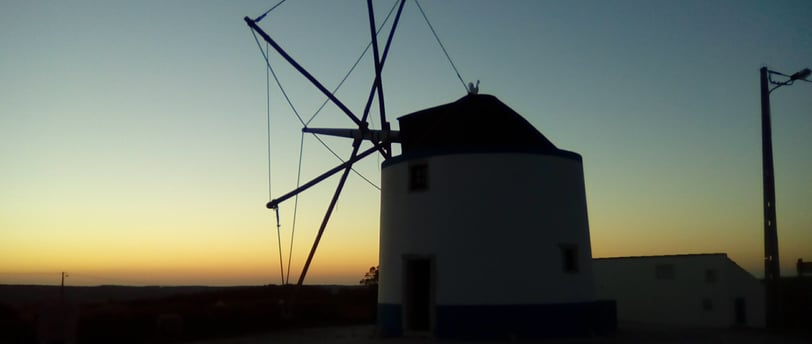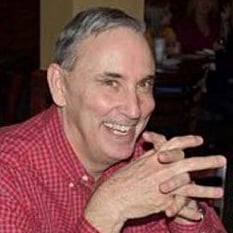GRANDPA'S FARM
ALM No.68, September 2024
ESSAYS


ROY W ROUSH greeted you as you pulled into the farm yard, his name emblazoned high up on the imposing red barn, just above the hay door. Nearby were five other outbuildings: a smaller, separate barn housed two tractors and various tractor implements, a chicken coop, a garage where a blue Buick Skylark was parked, a pumphouse and some distance away a pony shed within a fenced field. All of the farm buildings were wooden, painted red and covered by green asphalt shingles. A two-story, white clapboard house stood nearby with a screened-in porch and screen door, a petunia patch in the front yard and a sprawling white oak tree, which towered over the house.
This was my grandparents’ farm. Growing up we visited the farm each summer for two weeks. The six of us piled into our Pontiac station wagon and made the ten hour journey to the farm, which sat outside the tiny town of Van Buren, Indiana, where some eight hundred people lived.
Grandpa was born to be a farmer, the only life he wanted or imagined. His 140 acres of corn, soybeans and wheat constituted the sole, everlasting Heaven he ever sought. Grandpa was a happy man.
Grandma, whose domain was the house and chicken coop, was a stout woman who always wore long flowery dresses, blocky black shoes, and glasses, which usually hung from a chain around her neck. She weighed twice as much as her rail-thin husband, with his bulbous nose and bemused countenance. She worked sunup to sundown cooking, cleaning, pegging laundry in the side yard, collecting eggs, butchering chickens for dinner and making the best pies I’ve ever tasted. Her mien conveyed gravitas; grandpa’s, humor.
Upstairs in the farm house, a tall mahogany cupboard was filled with Ball Jars of tomatoes, corn, pickles, carrots, pumpkin and jams, all canned by grandma. It was also where we all slept, which we reached by walking up the unlit, slippery wooden stairs. There was but one bathroom in the house, which housed the smallest bathtub I’d ever seen, all of four feet long.
My brothers and sister and I loved going to the farm. There was so much to do and nowhere else was like it. The farm was rich in aromas, a potpourri of fragrances that hit us as soon as we opened the car door and set foot on the gravel driveway. The sweet smell of freshly cut hay, the earthy smell of cornfields, the gassy odor of cow manure, and the whiff of wild blueberry, all combined to convey to our sense of smell that we were on a working farm, far from the Eastern Seaboard from whence we came.
Like an observer with a window to the past, I can still see myself catapulting stones with my slingshot at crows who cawed at me disdainfully, or at rabbits I spooked from hedgerows. My brothers and I spent hours in the hayloft playing king of the mountain or swinging from the heavy rope that was used to hoist hay bales up and into it.
Grandpa kept a pony for us to ride with a saddle or in a pony cart. Dusty was the pony I remember best, a large pony and sometimes difficult to manage. Once, my sister and a cousin were riding in the pony cart when a car drove by on the gravel road in front of the farm—a rare occurrence— and startled Dusty, who tore off at a gallop and ended up in a ditch with the pony cart overturned. Thankfully, no one was injured, but grandpa turned bright red as he read the riot act to Dusty, as if Dusty would benefit from the tirade.
An equal, if not greater treat, was when Grandpa invited each of us to ride on his white International tractor while he cut hay or disced a field. It was a prodigious and tall tractor, and from our high vantage point we saw—in any direction we turned—endless flat, farm fields, the heart and soul of Indiana. The change from the highways and population centers of New Jersey to the gravel roads, towns and fields of Central Indiana seemed almost magical.
We always had a family reunion one evening during our stay. Roushs and Schweigerts, whose families were connected in a distant past that was fuzzy or forgotten. Aunts, uncles, cousins, children, in-laws, parents and grandparents came together to celebrate the good fortune of the clan and to swap stories and news. Picnic tables laden with delicious foods, including Grandma’s pies—red raspberry, blueberry and strawberry. Homemade ice cream, Orange Crush and Grape Nehi in bottles, capped these feasts.
It was a grand occasion filled with laughter and conversations. We chased after fireflies under a canopy of stars; we ran around with sparklers left over from July 4th and we took turns cranking the handle for the homemade ice cream. We threw baseballs up ever so high on the barn roof, and with our mitts we raced to catch them on their way down. We had fun as only children can.
Indelible memories of those years are more vivid the older I get. It’s as if life compensates us for our slowly failing bodies with lucid experiences from our past. Grandpa’s farm is long gone, the fences and hedgerows and buildings vanished, washed away by time’s relentless march, with only the house left, a rental in disrepair, on its way to history’s dustbin.
When we’re young, we live in the moment of such experiences and when we’re old, we savor the memories. Inside of us is sort of a projector slide show with thousands of slides we can effortlessly pick and choose to see in our mind’s eye. Grandpa sitting at the Formica kitchen table, balancing a saucer with hot coffee on it and watching him sip from it. His fingers crooked and arthritic, his hair white, his black rim glasses, and the same gray work shirt and pants, the only thing I ever saw him wear.
The last image I have of grandpa is when he was quite old. He appeared to be the ever- shrinking man, and it was likely the cancer that would take him in less than a year was already running rampant throughout his wiry body. It would be my last trip to the farm. I have a crystal clear picture of grandpa sitting on his smaller, slate gray Ford tractor in the forty acre field behind the main barn. It was sunset, with reddish fingers undulating in the sky above us. The farm was quiet. The tractor was stationery and grandpa was surrounded by twenty or so Black Angus cattle. He wore his customary gray cap and leather gloves, darkened by countless oil stains. I perched on the barnyard fence and watched him. I thought I could just barely hear him talking to the cattle.
I have little doubt that grandpa would not have liked to live in our world today. He was a man born in a different century. The complexity and rancor of today’s world would not have appealed to him. He definitely would eschew the industrialization of farming.
Grandpa has always played an outsized role in my life and in my memory of him and the farm. I don’t know if I’ve ever known anyone who absolutely fit in his time and place like grandpa did. I was lucky to have known him.
My wife and I have visited Van Buren over the years, where little has changed; the same post office, the same railroad through town and the single stoplight still watched over the only intersection. We stop by the cemetery to visit my grandparents’ graves as well as the numerous Roushs and Sweigerts, scattered throughout the cemetery, going back three hundred years.
I wish they were all still with us. I think of them often. Uncle Dow—who always kept change in his pockets, which you could hear him jingling whenever he was standing. Sweet Aunt Doris, who smiled most of the time and smelled of perfume. My cousin Greg, who always wanted to arm wrestle me because he always won. And my endearing mother, who could sashay across the room with the best of them. My proud and quiet father; a pillar of strength. They were the best of us.
Jeff Hyndman is a semi-retired IT person and a part time dog walker. He lives in an Atlanta suburb with his wife, Ellen, their dog, Carmella, and their cat, Chelsea, who pretty much runs the show. His essays have been published in a variety of literary magazines.


